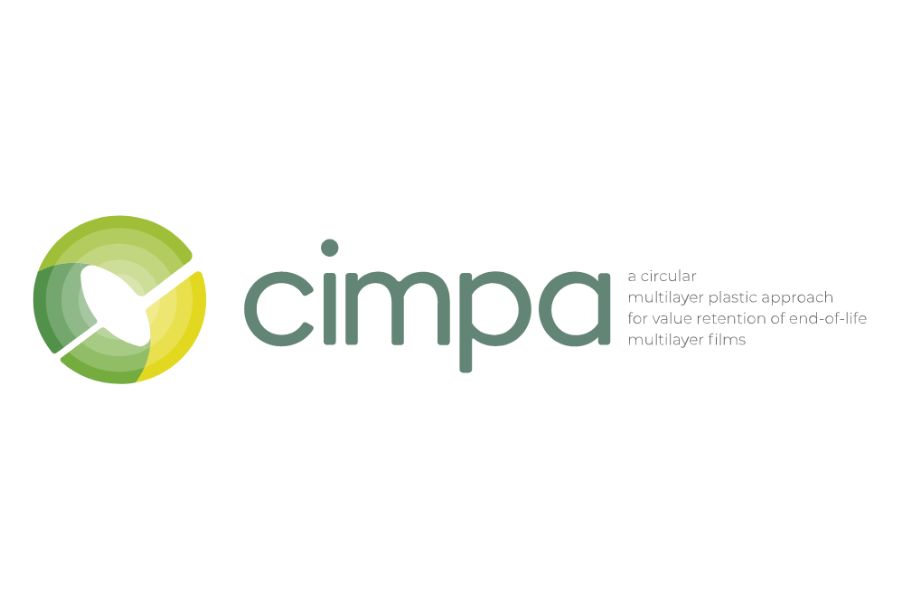Project Name: A CIrcular Multilayer Plastic Approach for value retention of end-of-life multilayer films
Open Call Topic(s): Green transition in Europe
Description
Several million tonnes of multilayer films are incinerated or dumped into landfills every year due to a lack of sustainable recycling solutions. The EU-funded CIMPA project will develop a recycling chain for post-industrial and post-consumer multilayer films from food and agricultural applications. This complex approach combines innovative compositional sorting, mechanical and physical recycling and an advanced decontamination process. A key objective is to produce recycled materials compliant with agriculture and food contact applications, validated for environmental and health safety. Preliminary estimations show that CIMPA will have significant positive impacts not only on the economy, but also on the environment.
CIMPA project, funded by the European H2020 program, brings together 13 partners from 5 countries, covering the entire value chain: waste management company (PAPREC), sorting technology providers (Filigrade and Pellenc ST), research institutes (IPC, AIMPLAS, VTT and TNO) and multilayer film producers (Eversia, Leygatech, Barbier), an institute for consumer attitude studies (Prospex), consultants (Benkei) and the European confederation representing the recycling industry (EuRIC).
Reason for applying to HSbooster.eu services
CIMPA aims to contribute to the creation of new standards or the revision of existing standards to achieve the circularity of multilayer plastic films in the packaging and agricultural sector.
CIMPA partners have already started to work on the identification of relevant existing standards, but due to the highly innovative nature of the project (innovative compositional sorting with digital watermarking, physical recycling, upgrading properties, etc), some aspects are not yet covered by standards. That is why CIMPA can identify need for updates and contribute to the revision/creation of new standards. For this relevant task, the Standardisation Booster service could support project partners and guide them to select the most suitable option (fast-track standards, technical specifications, etc,) to be developed in some months within the project.
The booster services can help CIMPA to select the relevant standardisation organisations to engage with in order to be able to influence the processes and contribute to current developments or proposals for modification of existing standards.
CIMPA could benefit from the services provided by the standardisation booster to deliver quality results with a greater impact on current norms and standards. With this support, CIMPA outcomes and best practices can be promoted and translated to standardisation activities, integrating research results into the existing standards landscape and fostering the development of new areas of standards activity and new markets. Finally, the booster services can facilitate the transfer of the CIMPA research results and outcomes into standardisation, which will ensure the exploitation and sustainability of the project results. This would contribute to the successful implementation of CIMPA research and innovation findings.
Main Standardisation Interests
CIMPA project includes the WP7 "Pre-normative studies, dissemination, communication and exploitation", led by EuRIC, which aims inter alia at monitoring and assessing standardisation, certification and technical specifications requirements.
There is currently a lack of standardisation or norms on ecodesign/design to recycling / circular design for plastic products. WP7 intends to analyse these gaps and address the needs to develop new standards, commenting on proposed and draft standars or suggesting ideas for new standards. Additionally, standardisation contributes to the sustainability of the CIMPA project. Therefore a specific task is dedicated to standardisation activities in WP7 (Task 7.1).
CIMPA partners are working on a report which offers a panoramic description of the legislative context having impacts on multilayer films circularity, which includes EU legislation and strategies as well as national legislation and plans in FR, BE, SP, NL and FI. Moreover, CIMPA partners have identified the most relevant existing standards regarding the design, manufacture, production and recycling of multilayer films. This is a key step to analyse the need for updates or development of new standards.
In a second step, CIMPA partners will produce a report with recommendations for legislative/regulations update/revisions and update or new standards to achieve ML films circularity. This final repor will be public and delivered at the end of the project (M35)
Moreover, product safety (food contact assessment) and circular by design protocols (addressed in WP1) will provide preliminary recommendations to be addressed to relevant standardisation committees.
In addition, some of the CIMPA partners are involved in technical standardisation committees (IPC, AIMPLAS and EuRIC).
Some CIMPA’s partners are also involved in CPA initiative, which is currently gathering existing guidelines on circularity; such work is important to make recommendations to EU and regulation bodies prior to future standards definition.
Project Acronym: CIMPA

Grant Agreement Id: 101003864
Start Date:
End Date:
Programme: H2020-EU.3.5. - SOCIETAL CHALLENGES - Climate action, Environment, Resource Efficiency and Raw Materials
Call for proposal: H2020-SC5-2018-2019-2020
Funding Scheme: RIA - Research and Innovation action



